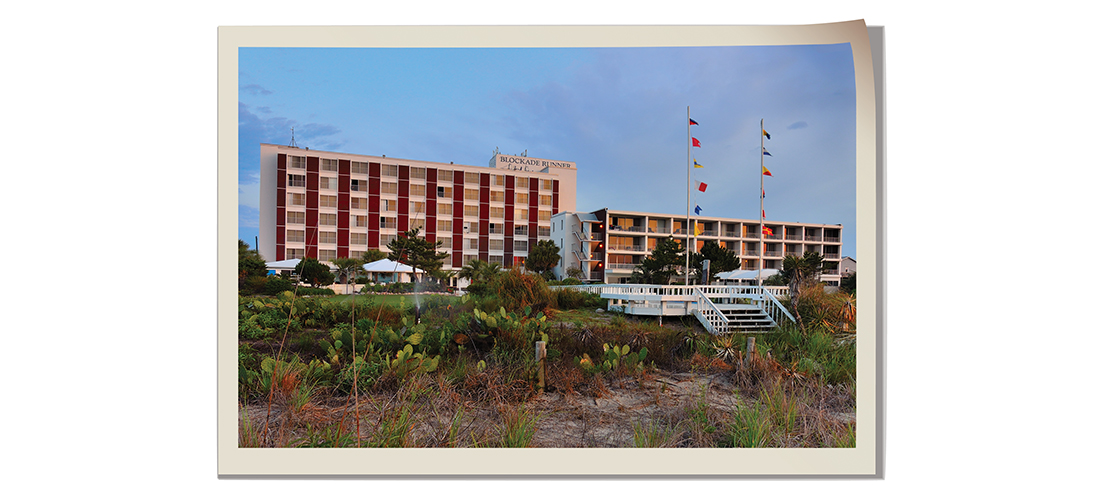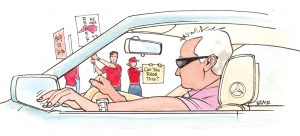
Stormy Weather
After withstanding decades of hurricanes, Wilmington’s Blockade Runner is ready to defy the odds once more
By Jim Dodson
On October 10 of last year, Hurricane Michael made landfall on the panhandle of Florida packing sustained winds of 160 mph, a storm verging on Category 5 that entered the record books as the third strongest hurricane on record. After fully devastating Mexico Beach, Michael churned toward the Carolinas as a tropical storm over the next two days, claiming 54 lives from Florida to Virginia, causing $25 billion in property damage.
On the afternoon Michael arrived in North Carolina, I watched on my iPhone weather app as the storm spread its mayhem over Charlotte and took some comfort that the winds and rain were expected to diminish to 30 mph tropical gusts by the time the storm reached the Triad.
The winds and rain arrived on schedule around 3 p.m. Since we live in a neighborhood filled with century-old hardwoods, I stepped outside to see how our elderly trees were handling the winds after one of the wettest autumns on record.
The winds suddenly increased and something blew off my roof with a clatter. It turned out to be a chimney cap, airlifted halfway across our front yard. As I walked over to pick it up, keeping an eye on the churning treetops, things got even crazier. I heard what sounded remarkably like an oncoming freight train and turned around just in time to see the peak of our neighbor’s roof vanish beneath what appeared to be a madly swirling cloud. Having once been dangerously close to a large tornado, I wasn’t anxious to repeat the experience.
I headed straight inside to chase wife and dogs to the basement but suddenly remembered that I’d left the door to my home office over the garage standing ajar. Like one of those Russian babushkas who insisted on sweeping her stoop before evacuating the Chernobyl nuclear site, I foolishly bolted out the back door even as my phone began shrieking a weather alarm to take shelter immediately.
Taking two steps at once, I reached the top of the garage steps just as the large wooden electrical pole at the rear of our property, bearing a major transformer and various cable lines, snapped like a twig and flew past me like the witch from The Wizard of Oz, crashing into our backyard with a vivid explosion of sparks. For several seconds, I stood there stunned by what I’d seen . . . until I had the good sense to turn around and bolt for the basement.
What turned out to be a microburst or tornado, spawned by the fury of Michael’s tropical remnants, knocked over half a dozen ancient trees along our street and plunged the neighborhood into darkness for more than a week. We were among the fortunate ones, though. Our generator came on, and chainsaws came out and neighbors began appearing outside to help assess the damage and begin the cleanup process. Several folks on the street suffered major damage from trees that toppled directly onto their houses, but fortunately there we no serious injuries on our side of town.
My thoughtful neighbor Ken, who lives across the street and had a massive oak take out his center chimney and new second-floor bathroom renovation, shook his head and said it best. “Incredible, isn’t it? Nature’s power always seems to have the final word.”
A few weeks ago, I mentioned this frightening scenario and Ken’s comment to Bill Baggett as we sat together in a newly renovated room on the top floor of the historic Blockade Runner Hotel at Wrightsville Beach. Baggett, 72, simply smiled.
“Nature’s fury has the only word,” he added.
With the first of June looming — the official start of the Atlantic hurricane season that lasts until November 30 — Baggett and his sister Mary, who jointly own and operate arguably the most beloved and well-known hotel on the North Carolina coast, are something akin to experts on the fickle fury of hurricanes and the unpredictable damage they leave in their aftermath.
Since their family purchased the Blockade Runner from its original owner, Lawrence Lewis of Richmond, Virginia, in 1971, the Baggetts — who assumed operational management of the property in 1984 — have ridden out half a dozen major Atlantic hurricanes and several near misses while hunkered down inside their cozy seaside hotel. Their legacy began with Hurricane Diana in 1984 and continued through last September’s Hurricane Florence, the sea monster that preceded Michael and turned Wilmington and much of Eastern North Carolina into a vast world of water, marooning the Port City for weeks.
In 1984, Diana blew out the hotel’s old-style windows and flooded the ground floor of the hotel with wind-driven rain. “Structurally the hotel was fine. It’s made of reinforced industrial concrete.” Baggett recalled that the worst thing that happened was that the covering for the air vents blew off, allowing rain to flood rooms and public spaces, while destroying plaster walls and ceilings “The hotel was soaked, a real mess, physically and legally,” he said.
When the Baggetts declined to accept their insurance company’s insufficient payout of just $12,000 to cover the extensive damages, they took their case to court, enlisting an expert witness in the person of a retired meteorologist from the Miami Hurricane Center named Robert Simpson, for whom the Saffir-Simpson Hurricane scale is named. His testimony resulted in a more satisfactory settlement — and a new insurance company going forward.
Three hurricanes in quick succession followed within a decade. Hurricanes Fran (September 1996; 27 fatalities, $5 billion total damage), Bonnie (August 1998, no fatalities but 950,000 people evacuated from the Carolinas, total damage: $1 billion) and Floyd (September 1999, extensive flooding, 76 fatalities, $6.5 billion in total damage) tested the moxie of the Baggetts and their stout lodging. In 1989, even Hurricane Hugo took a passing swipe that blew out Blockade Runner’s windows but otherwise left the property unscathed.
“Fran was pretty bad,” Baggett recalled. “It took a typical path up the Cape Fear and right over the top, sucking up water from both sides of the hotel — the ocean on one side, the sound on the other. For a while, it was like being in an aquarium,” he allowed with a laugh. “There were six of us in the hotel that night — Mary and myself, one of our cooks and several maintenance folks. Around 11 p.m., the window wall blew out and the water came rushing in, ruining carpets and floors. It was a long night but really the damage in that instance was fortunately fairly minimal. The hotel itself was fine.”
In Fran’s aftermath, in fact, emergency crews from the Red Cross, power companies and relief agencies billeted at the Blockade Runner, which was up and running in a matter of days. “The real issue,” Baggett explained, “was that Fran did serious damage to docks along the sound — prompting fears that the annual Flotilla might be cancelled. Fortunately, everyone worked hard to get the island back in shape and the event came off.”
For her part, Hurricane Bonnie looked fearsome but passed over relatively quickly, moving so swiftly she only took a portion of the Blockade Runner’s roof.
Floyd, however, brought rain on a Biblical scale that flooded numerous towns across the Eastern portions of the state, killing livestock and damaging crops. But once again, with its new roof, the Blockade Runner was updated and “hurricane ready,” as Bill Baggett put it. When Hurricane Matthew banged along the entire east coast in early October of 2016, the hotel barely noticed its passing.
And then, last September, came Florence — a Cat-4 monster that brought new levels of devastation to Wilmington and surrounding region.
“We were a little concerned that she was predicted to come ashore as a Cat-4 hurricane, but we planned to stay in the hotel and ride it out regardless,” said Hurricane Bill Baggett. “I mean, where would we evacuate to — some stick-built motel on the mainland? This hotel is made from industrial reinforced concrete. Besides, by the time the hurricane was on top of us, the only real concern we had — besides water — was the wind.”
By the time Florence rolled over Wrightsville Beach early on Friday morning, September 14, wind shear had weakened the storm to Category 1, wind gusting to 105 mph, which was still sufficient to take out the roof of the Blockade Runner’s balcony and soak some of the hotel’s premium seaside suites.
The major problem with Florence was a record high storm surge of 10 to 13 feet at high tide and the volume of rain. Over two days the storm stalled and lingered over the region, dumping more than 45 inches of rain in places — including on top of the hotel — downing thousands of power lines and trees, making Florence the wettest tropical cyclone to ever hit the Carolinas.
“We lost vents again and had water in some of our tunnels,” Baggett told me, “but for the most part we were in better shape than most people around us.” Because of their working partnership with BELFOR, the property damage specialists who work across the country, response teams were on the site within a day, bringing emergency fuel that allowed the hotel to operate its three large cooling generators and drying machines.
In the aftermath of Florence, much of Wilmington was underwater for the next two weeks, as were numerous towns and cities across Eastern North Carolina.
Fifty-seven deaths were attributed to the storm, and $24 billion in damages to property in North Carolina alone, more than the cost of Matthew and Floyd combined.
As many have done in the wake of Florence, in the process of repairing the damage to their hotel balcony suites, the Baggetts decided to undertake a comprehensive renovation of their landmark hotel, enlisting designer Terry Allred to give the property a fresh new tropical look from top to bottom. The extensive $11 million redo, which includes makeovers of every guest room, dining room and public spaces, is ready to welcome longtime customers and perhaps a new generation of beachcombers to the hotel just as a new summer vacation season dawns.
“Hurricanes are amazingly unpredictable things,” Bill Baggett mused as he showed me through the bright new suites on the balcony floor. “It’s a new roll of the dice every time one of those storms comes out of the Caribbean. But with a jewel like this, Mary and I feel like we are stewards of the hotel. It’s been a pleasure to try and improve it over the years, regardless of whatever comes at us from the sea.” He paused and smiled. “One thing for sure. When the next one comes, we’ll still be here in the hotel.” OH
Contact Editor Jim Dodson at jim@thepilot.com.





